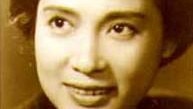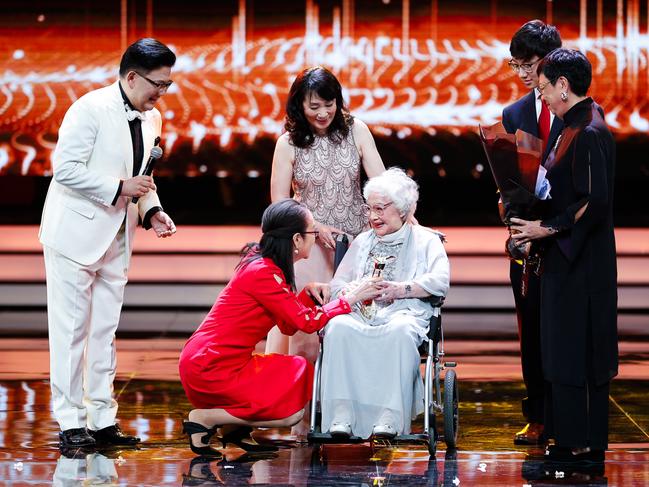Chinese actor Qin Yi was the biggest star in her own life story
Chinese Premier Zhou Enlai called actor Qin Yi the country’s most beautiful woman – but her main role was always looking after her son.

Qin Yi. Actor.
Born Shanghai, China, January 31, 1922; died Shanghai, May 9, aged 100.
-
Qin Yi’s life reflected the upheavals in her country across the 20th century. She was once China’s favourite film star. Always describing herself as a “supporting actor”, that is what she did throughout the entire life of her afflicted son – a role in which she starred.
She was born into a large family of “many daughters” – possibly 10 – when infant mortality was so prevalent few Chinese had more than two or three children. It helped that Qin’s parents were relatively wealthy. Even so, perhaps overwhelmed by another child, Qin was given to an orphanage days after her birth, possibly at the instigation of her mother. An older sister retrieved the baby girl and brought her back to the family.
Her father would take his daughters to the cinema in the era of silent films. Qin loved tragic Chinese actor Ruan Lingyu, whose career and personal life followed a similar trajectory to that of doomed Hollywood star Rudolph Valentino. China was producing 300 films a year and no one was bigger than Ruan. She took her life aged 24 in 1935 and was seen off in a funeral procession that was almost 5km long, during which, it was reported, three mourners also took their own lives.
Qin’s mother was disinclined to have her youngest daughter educated, but the same sister who had brought her back to the family detected a keen intelligence in her youngest sibling and insisted she go to school, where she studied business.
But in 1937 the Japanese launched their overwhelming battle for Shanghai and 190,000 Chinese were killed in just four months. Qin’s family moved inland to Wuhan. When Wuhan fell, leader Chiang Kai-shek moved the seat of government further west to Chongqing. Qin’s family fled there too.
Once settled in relative safety, Qin joined some theatre groups and began to study acting. She appeared in dozens of plays – many with an anti-Japanese theme – and, aged 21, was an acclaimed actor. She made shoes and clothing for the Chinese soldiers and at one point moved to the frontline to become a stretcher bearer.
Returning to the liberated Shanghai in 1946 she appeared in her first feature film, rising director Wu Yonggang’s The Loyal Family. When Mao Zedong prevailed in the civil war and the Kuomintang fled to Taiwan, the communists adopted film as a powerful propaganda too. Moviemaking flourished. Qin and three others were officially anointed as the top four actresses. New Chinese Premier Zhou Enlai described Qin as the country’s most beautiful woman.
She worked with already famous actor Chen Tianguo, whom she married, later revealing that the violent alcoholic had raped her on their first outing. They had a daughter but soon divorced. Qin then married the dashing film star Jin Yan and in 1948 they had a son, Jin Jie. He was a troubled boy with an unmanageable temper and would hit his mother, but Qin was devoted to him.
This was the time of the Great Leap Forward that almost crippled the country and led to the famine that claimed up to 55 million lives. By the time Jin was diagnosed with schizophrenia China had begun the insanity of the Cultural Revolution, and Qin was sent to labour on a farm and subjected to “struggle sessions” during which youthful fanatics known as Red Guards goaded locals to humiliate and denounce those whose commitment to communism was doubted.

After Mao’s death, Qin made a comeback and in 1983 – the year her husband died – won the inaugural China TV Golden Eagle Award, an esteemed Oscar-like prize. But her commitment to Jin, whom she bathed, dressed and fed while managing his daily insulin injections, never wavered, even if it meant she had to turn down roles because she could not travel.
“I have to give him the most sincere love and care,” she said. Qin early on discovered his natural talent for art, which she encouraged, hiring a teacher to visit once a week. And she would cheer up Jin and other handicapped people, taking them outdoors to practise their painting and sketching, which kept Jin calm. He saw all his mum’s films.
In 2002 Qin organised an exhibition of these works at a charity auction in Shanghai. Actor Arnold Schwarzenegger, soon to be governor of California, attended and bought one of Jin’s paintings for $36,000, saying: “Qin Yi is a Chinese movie star I admire, and at the same time she is a great mother.”
Jin died, aged 59, in 2007. The following year Qin donated the 200,000 yuan ($42,800) she had saved for his care, should she predecease him, to the Sichuan earthquake fund.




To join the conversation, please log in. Don't have an account? Register
Join the conversation, you are commenting as Logout